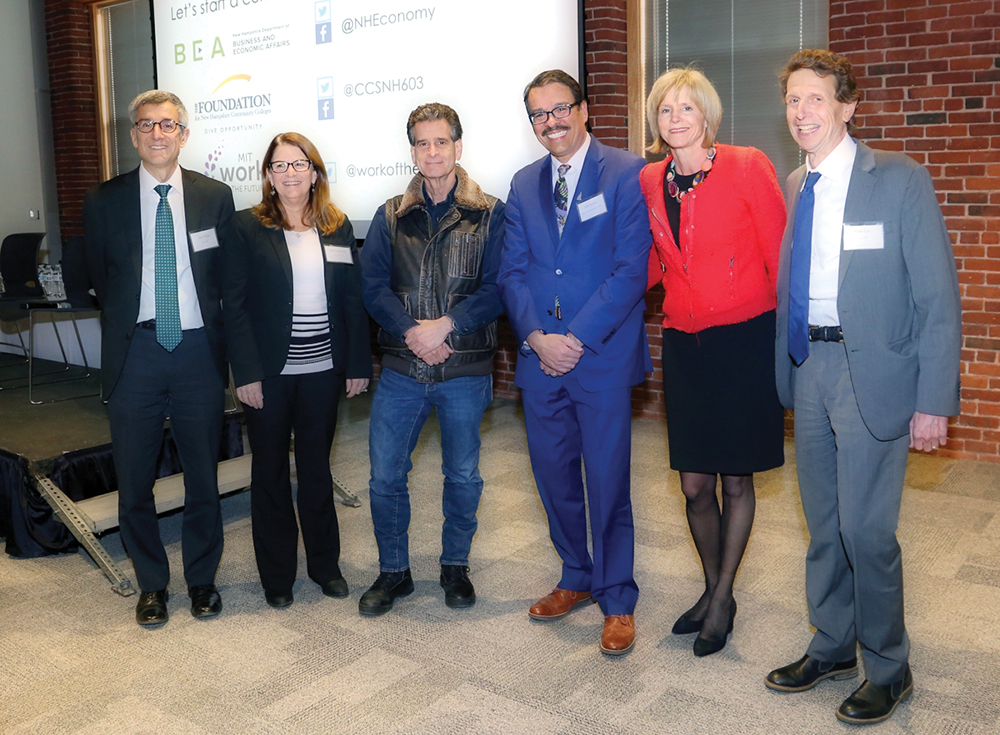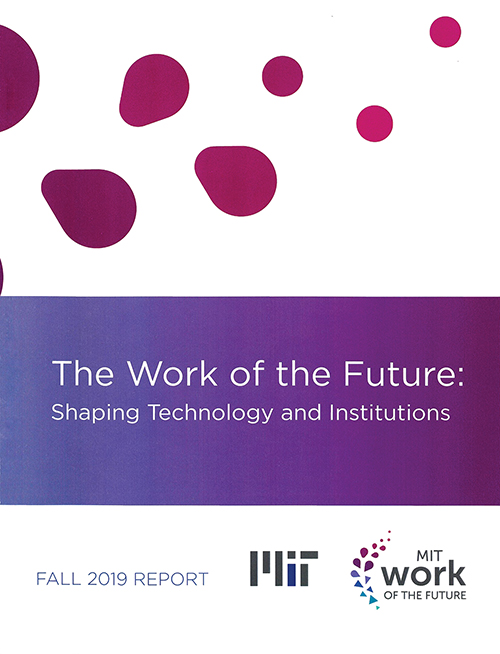
From left: Joseph Helble, provost, Dartmouth College; Kim Cadorette, VP of Operations, BAE Systems; Dean Kamen, CEO of DEKA; Will Arvelo, director, NH Division of Economic Development; Elisabeth Reynolds, executive director, MIT Task Force on Work of the Future; Ross Gittell, former chancellor of Community College System of NH. Courtesy of NH BEA. (Photo was taken prior to the COVID-19 pandemic.)
As artificial intelligence and robotics transform the workplace, a regional task force, convened by Massachusetts Institute of Technology (MIT), has begun a conversation around ways to bring government, industry, and education together to upskill workers and encourage companies to augment the workforce rather than displace it.
 The MIT task force’s report, “The Work of the Future: Shaping Technology and Institution,” explores the legacy of technology in the American workplace and how technological advances have devastated many middle-class jobs, contributing to record levels of inequality and significantly reduced social mobility.
The MIT task force’s report, “The Work of the Future: Shaping Technology and Institution,” explores the legacy of technology in the American workplace and how technological advances have devastated many middle-class jobs, contributing to record levels of inequality and significantly reduced social mobility.
According to the report, the digital era has increased the rate of market polarization where high-education/high-wage and low-education/low-wage jobs increase at the expense of middle-skills jobs. For about 40 years following World War II, worker pay and productivity grew at about the same rate, but by about 1980, worker pay began to flatline. Elisabeth Reynolds, executive director of the MIT Work of the Future task force, points out that even though the demand for workers is up, the pay is not.
“We have lost a lot of manufacturing, clerical and administrative jobs,” says Reynolds at an event held earlier this year at DEKA in Manchester. “We see a growth in low-skill, a growth in high-skill, and nothing in the middle. There is tremendous opportunity at the top in this economy, but with the low skill jobs, there’s no career path.”
In a discussion that followed Reynolds’ presentation, panelists representing manufacturing, health care and education spoke about NH’s workforce challenge and how companies are looking for solutions in partnerships and technology.
Sarah Currier, vice president of workforce strategy at Dartmouth-Hitchcock in Lebanon, says despite hiring 350 people a month, the organization has struggled during the past year to fill 1,000 open positions.
“If I can’t fill this gap with humans, how do I start to think about work differently, find ways to use robots, artificial intelligence or create a partnership between people and technology?” She says there may be things robots can do, while at the same time, the organization can upskill workers to support that technology.
Kim Cadorette, vice president of operations at BAE Systems in Nashua, says manufacturers still need skilled workers to teach robots. “Automation is great when you have high volume, but not every product is made by the millions like cellphones. There is a huge piece of the manufacturing center where we don’t build millions of things,” she says. “Highly skilled workers are required to build the products of today that may turn into the cellphones of tomorrow.”
She adds BAE Systems partnered with Nashua Community College to create a training program that would help fill its own pipeline and that of other local manufacturers. “Industry, academia and government must all work together because no one can solve the problem alone,” she says. “It took all three parties coming together to move the needle.”
Joseph Helble, provost of Dartmouth College in Hanover, says schools need to get students excited and engaged in the work of the future so that their learning is deep. He says Dartmouth College is partnering with local school systems and a local science museum to prepare “the next generation of students for life in the AI-machine-learning-transformed economy.” He says Dartmouth is bringing the engineering school, the computer science program and entrepreneurship center together to foster technology and job creation.
Ross Gittell, former chancellor of NH’s Community College System, says the system is also looking to integrate liberal arts into the technology curriculum with support from University of NH. “The human skills are really important to complement those technology skills for middle-skilled workers,” he says. “It’s important for our graduates to understand the larger context in which they will be operating.”
Reynolds says in addition to partnerships and skill-building, the report also calls for rebalancing capital labor. She says the federal R&D tax credit has been successful at spurring capital investment. “Can we do something similar for human capital? Are there ways we can incent an investment in human capital moving forward, not just physical capital?” she asks.
Will Arvelo, director, NH Division of Economic Development says, “We must not let technology widen inequality, we see this as both a challenge and an opportunity."

 Current Issue - July 2024
Current Issue - July 2024